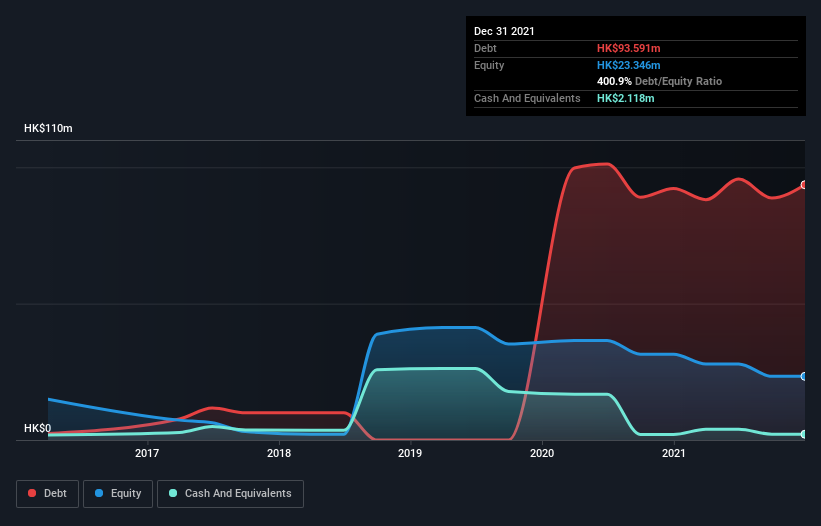- Hong Kong
- /
- Food and Staples Retail
- /
- SEHK:8241
Is Ying Kee Tea House Group (HKG:8241) A Risky Investment?
Howard Marks put it nicely when he said that, rather than worrying about share price volatility, 'The possibility of permanent loss is the risk I worry about... and every practical investor I know worries about.' So it seems the smart money knows that debt - which is usually involved in bankruptcies - is a very important factor, when you assess how risky a company is. Importantly, Ying Kee Tea House Group Limited (HKG:8241) does carry debt. But should shareholders be worried about its use of debt?
What Risk Does Debt Bring?
Generally speaking, debt only becomes a real problem when a company can't easily pay it off, either by raising capital or with its own cash flow. Part and parcel of capitalism is the process of 'creative destruction' where failed businesses are mercilessly liquidated by their bankers. However, a more frequent (but still costly) occurrence is where a company must issue shares at bargain-basement prices, permanently diluting shareholders, just to shore up its balance sheet. Having said that, the most common situation is where a company manages its debt reasonably well - and to its own advantage. When we think about a company's use of debt, we first look at cash and debt together.
See our latest analysis for Ying Kee Tea House Group
What Is Ying Kee Tea House Group's Debt?
The chart below, which you can click on for greater detail, shows that Ying Kee Tea House Group had HK$93.6m in debt in September 2021; about the same as the year before. On the flip side, it has HK$2.12m in cash leading to net debt of about HK$91.5m.

How Strong Is Ying Kee Tea House Group's Balance Sheet?
Zooming in on the latest balance sheet data, we can see that Ying Kee Tea House Group had liabilities of HK$17.0m due within 12 months and liabilities of HK$79.8m due beyond that. Offsetting these obligations, it had cash of HK$2.12m as well as receivables valued at HK$800.0k due within 12 months. So its liabilities outweigh the sum of its cash and (near-term) receivables by HK$93.9m.
When you consider that this deficiency exceeds the company's HK$79.2m market capitalization, you might well be inclined to review the balance sheet intently. Hypothetically, extremely heavy dilution would be required if the company were forced to pay down its liabilities by raising capital at the current share price. The balance sheet is clearly the area to focus on when you are analysing debt. But it is Ying Kee Tea House Group's earnings that will influence how the balance sheet holds up in the future. So when considering debt, it's definitely worth looking at the earnings trend. Click here for an interactive snapshot.
In the last year Ying Kee Tea House Group wasn't profitable at an EBIT level, but managed to grow its revenue by 6.4%, to HK$37m. We usually like to see faster growth from unprofitable companies, but each to their own.
Caveat Emptor
Importantly, Ying Kee Tea House Group had an earnings before interest and tax (EBIT) loss over the last year. To be specific the EBIT loss came in at HK$3.9m. Considering that alongside the liabilities mentioned above make us nervous about the company. We'd want to see some strong near-term improvements before getting too interested in the stock. For example, we would not want to see a repeat of last year's loss of HK$7.9m. In the meantime, we consider the stock to be risky. When analysing debt levels, the balance sheet is the obvious place to start. However, not all investment risk resides within the balance sheet - far from it. These risks can be hard to spot. Every company has them, and we've spotted 3 warning signs for Ying Kee Tea House Group (of which 1 can't be ignored!) you should know about.
When all is said and done, sometimes its easier to focus on companies that don't even need debt. Readers can access a list of growth stocks with zero net debt 100% free, right now.
New: Manage All Your Stock Portfolios in One Place
We've created the ultimate portfolio companion for stock investors, and it's free.
• Connect an unlimited number of Portfolios and see your total in one currency
• Be alerted to new Warning Signs or Risks via email or mobile
• Track the Fair Value of your stocks
Have feedback on this article? Concerned about the content? Get in touch with us directly. Alternatively, email editorial-team (at) simplywallst.com.
This article by Simply Wall St is general in nature. We provide commentary based on historical data and analyst forecasts only using an unbiased methodology and our articles are not intended to be financial advice. It does not constitute a recommendation to buy or sell any stock, and does not take account of your objectives, or your financial situation. We aim to bring you long-term focused analysis driven by fundamental data. Note that our analysis may not factor in the latest price-sensitive company announcements or qualitative material. Simply Wall St has no position in any stocks mentioned.
About SEHK:8241
Ying Kee Tea House Group
An investment holding company, engages in the retail trading of tea products for individual and corporate customers in Hong Kong.
Slight risk with imperfect balance sheet.
Market Insights
Community Narratives



